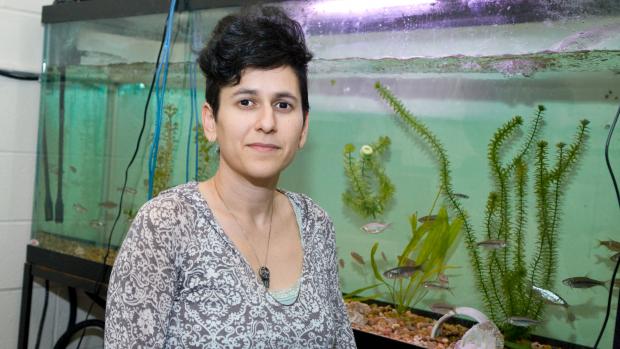Want Consensus? Look to Fish

A flock of birds. A school of fish. An army of ants. Glance at these groupings and they appear to move in unison effortlessly. Take a closer look and you’ll see an intricate symphony of leaders and followers, cues and signals, consensus building and decision-making.
Nicole Abaid, a PhD student in the Polytechnic Institute of New York University’s (NYU-Poly) Mechanical Engineering program, is helping to better understand how agents (the bird, the fish or the ant) in such systems influence the collective actions of the group. Scientists and engineers can use the information to protect animals by steering them away from hazards like an oil spill by introducing a robotic animal to the group that mimics the movements of its natural counterpart.
In November, Abaid’s paper, “Influence of Leaders on Mean Square Consentability in Biologically-Inspired Stochastic Networks,” co-written with NYU-Poly Associate Professor of Mechanical Engineering Maurizio Porfiri, won the best student paper award at the ASME Dynamic Systems and Control Conference in Virginia.
The paper put forth an algorithm called a consensus protocol that describes a group of agents who are trying to agree on a decision by interacting in the group and with external leaders. The novel part of their work is that how the agents select with whom to interact is inspired by how animals perceive numbers. Their protocol can help determine how long it takes for a group to reach an agreement, such as which direction to travel.
Abaid’s paper, and the research she conducts in Porfiri’s Dynamical Systems Lab, is based on fish. “We write mathematical equations inspired by animal behavior and psychology that can generate patterns like those we see in fish schools,” explains Abaid. “We also extract patterns from large data sets, for example from videos of fish schools, to better understand the phenomena that govern such behaviors.”
The lab’s use of robotic fish alongside live fish was one of the reasons Abaid chose to join NYU-Poly four years ago, saying it “sounded incredibly exciting.”
Abaid grew up in Florida and earned her BS in mathematics from the University of North Carolina at Chapel Hill and an MA in mathematics from the University of Kansas. She says that one of the challenging aspects of her research is solving problems that she isn’t sure she has a solution for. “I spend time understanding what I know, what I don’t know, and what I want to know to organize my thinking.” She notes that, “to make the jump from not-knowing to knowing may require a lot of creativity.” Her technique: pretend a solution exists and just try to uncover it.
Abaid’s PhD work also involved three years as a GK-12 fellow with the National Science Foundation-funded AMPS program NYU-Poly Professor Vikram Kapila directs. Abaid taught mechatronics lessons and coached LEGO robotics teams in local K-12 schools as part of her fellowship.
The Dynamical Systems Lab is funded in part by a National Science Foundation CAREER grant awarded to Porfiri.




